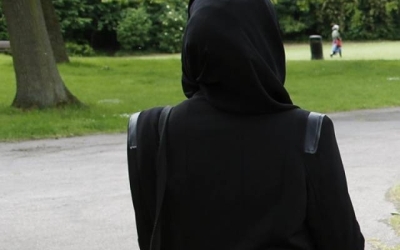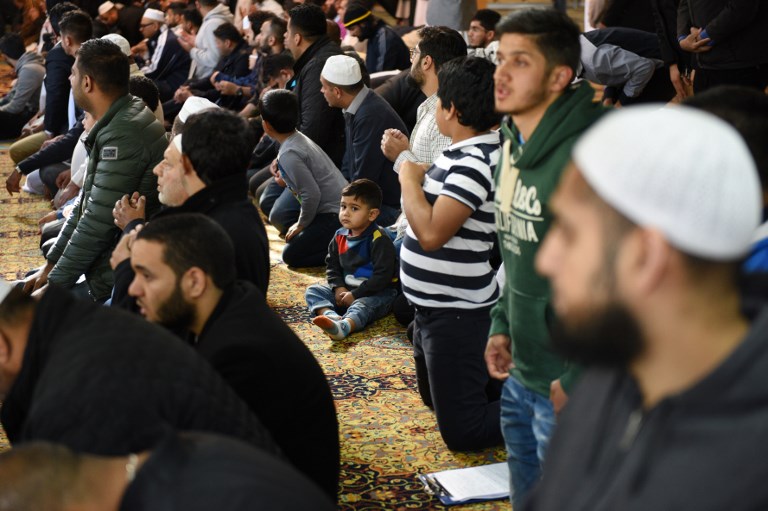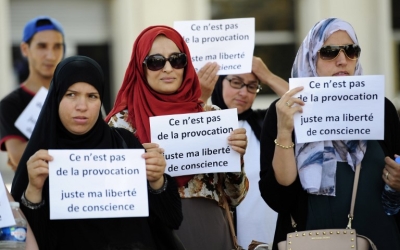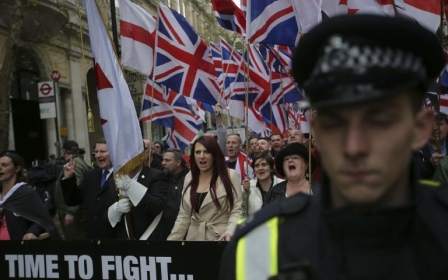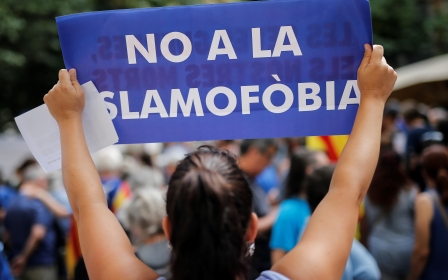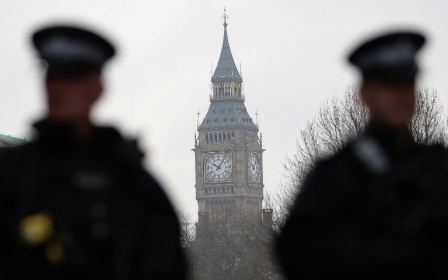This week the British establishment proved Islamophobia is alive and well
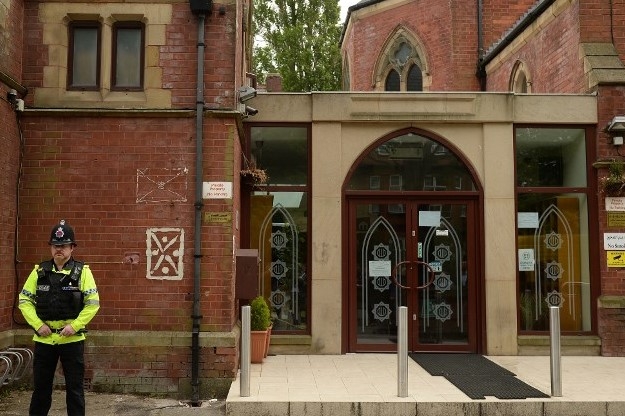
It has been a week for those decrying the idea of institutional Islamophobia in Britain to inadvertently prove that it exists.
First, there was Policy Exchange's report, "On Islamophobia," co-authored by the erstwhile head of the Equality and Human Rights Commission, Trevor Phillips. Then Martin Hewitt, chair of the National Police Chiefs Council, weighed in with concerns about an all-party parliamentary group's proposed definition of Islamophobia.
Hewitt suggested that defining Islamophobia as "rooted in racism and … a type of racism that targets expressions of Muslimness or perceived Muslimness" is too broad.
The police chief said the definition could cause confusion for officers enforcing it, be used to challenge legitimate free speech regarding "Islamic states," and undermine counter-terrorism efforts. By the end of Wednesday, his leaked letter to the prime minister appeared to have done the trick, scuppering both Conservative party and UK government acceptance of the definition.
Hewitt's "concerns" ring hollow with anyone who has an inkling of what Muslims have been experiencing for decades.
New MEE newsletter: Jerusalem Dispatch
Sign up to get the latest insights and analysis on Israel-Palestine, alongside Turkey Unpacked and other MEE newsletters
Few would argue that anti-Muslim hate crime has been handled properly at the street or policy level
On the surface, the government has capitulated to Policy Exchange's and Hewitt's depictions of determined, yet confused police officers. Really? To add insult to injury, Hewitt's remarks were prefaced with the following: "We take all reports of hate crime very seriously and will investigate them thoroughly."
The reality and the depiction couldn't be farther apart. We live in an age where a media commentator can call for gunships to be used against Muslim refugees she describes as cockroaches, politicians deride Muslim women as letterboxes and bank robbers, state inquiries are commissioned that blame Muslims for their own disadvantage, and an anti-terrorism regime profiles Muslims to the extent that schoolchildren as young as four are reported to the police.
Changing the conversation
As powerful as the all-party group's definition is in the evolution of language needed to tackle Islamophobia from a legislative perspective, the chances of it creating a legal regime change so revolutionary as to bring redress on any or all of the structural instances of anti-Muslim hatred are slim.
The sensitivity around the definition shows, however, that the change in conversation – from a begrudged focus on individual racists to acknowledging an environment of anti-Muslim hatred – is happening. It is an indictment of the way politics works in this country that a small think-tank's words are parroted by a senior police officer into the ears of government, with such effect.
Twenty years ago, the Macpherson report on police racism should have ensured that the conversation finally moved beyond the idea of bad apples – but instead, we have seen a painful rollback of the idea that institutional racism is real, and that the state and its institutions are culpable.
Few would argue that anti-Muslim hate crime has been handled properly at the street or policy level. Yes, some police forces have made positive noises, but after more than a decade of such noise, there is little to show in terms of effective training of frontline officers to even recognise Islamophobic intent. Ask any caseworker dealing with victims of Islamophobic hate crime, and they will give you a litany of cases where police have either not understood whether something is motivated by anti-Muslim hatred, or worse still, haven't cared less.
Street crimes, whether verbal insults or acts of extreme violence, have risen exponentially. The work of the Islamic Human Rights Commission (IHRC) shows a rise in hate crimes from 13.9 percent of Muslims surveyed in 2010 to 17.8 percent in 2014. If extrapolated to the UK's entire Muslim population, this means around 500,000 people have been affected. Data produced by the University of Sussex pegged the figure at 71 percent. In a closed-door meeting with senior police officials, I was surprised to find that this figure was in line with internal police projections.
A few bad apples?
Yet the idea that there is actually just a small problem with street crimes against Muslims based on "anti-Muslim bias" holds sway with the government. After everything, we are supposed to believe that anti-Muslim hatred is only about those few bad apples who are both the perpetrators and the cause of such bias.
This narrowing of the lens through which we understand racism disguises the role of the state and its institutions in whipping up the culture of hatred that incites such crimes and perpetuates and reproduces discrimination at school and work, along with the accountability this demands.
Currently, legal redress entails, at best, the ability to complain about an article for maligning an individual on the basis of religion, and to find money and a case to bring strategic litigation against a discriminatory law. In the case of government, the ballot box has been the most lacking; rather than being able to vote out parties that use Islamophobia as a rhetoric of distraction, it is now a vote-winner.
Hewitt and Policy Exchange have claimed the all-party group's definition was not the result of wide consultation. Neither are their own positions. They evidence exactly the privilege of the powerful – to push and provide a narrative that not only protects the status quo, but insists progressive voices are the opposite. They instrumentalise Islamophobia – propagating the idea that justice for Muslims may undermine freedom and security – and in so doing, entrench it even more.
Depicting a nightmare
Policy Exchange's "On Islamophobia" report leaves almost no-one out in its critique of the term Islamophobia. The authors choose to smear rather than to look at the mass of evidence produced by organisations, activists and academics on the scale and cause of anti-Muslim hatred – whether on our streets or screens, in our parliament or press.
They are labelled as pro-Palestinian; as daring to accuse pundits, politicians and the state of racism and even daring to satirise them; and as failing to accept the right to free speech. Their calls for legislation are lambasted as revealing "in part a mechanism for leveraging them into the position of official representatives of, and gatekeepers for, Britain's Muslim communities".
The nightmare being depicted is not, then, that Muslims are doing something different; it is that they may wield power and sit atop a societal hierarchy
The nightmare being depicted is not, then, that Muslims are doing something different; it is that they may wield power and sit atop a societal hierarchy alongside, or even instead of, Policy Exchange and its ilk.
At least one of the report's authors appears to be suffering from amnesia. Phillips, now deeply critical of IHRC's Islamophobia Awards, has forgotten how he supported the event at its inception. In a letter to IHRC in 2003, he stated "what a good idea these awards are," adding that the rise in "anti-Muslim incidents is indeed alarming" and pointing to the need for legislation.
Power dynamics
Alarming rises in anti-Muslim incidents. The need for legislation. Research from the community. It's not really about what is being asked for. It is about who has the power to ask for it, and who is legitimised to demand it.
Policy Exchange's arguments are exposed further, in that they support the International Holocaust Remembrance Alliance's (IHRA) definition of anti-Semitism. The IHRA definition is deeply divisive and proscriptively curtails the possibility of criticising Israel. There is no confusion here; just noise and bluster drowning out demands for equality, however those demands are imagined.
As Harun Khan, secretary-general of the Muslim Council of Britain, rather politely put it, Hewitt's claims that the implementation of the all-party group's definition would undermine anti-terrorism efforts can only have meaning if those policies were in fact Islamophobic in the first place.
Forget the bad apples. The British establishment has shown us that we need to focus on the state and the narrow-interest apples – I mean groups – that wield power within this framework.
The views expressed in this article belong to the author and do not necessarily reflect the editorial policy of Middle East Eye.
Middle East Eye delivers independent and unrivalled coverage and analysis of the Middle East, North Africa and beyond. To learn more about republishing this content and the associated fees, please fill out this form. More about MEE can be found here.



